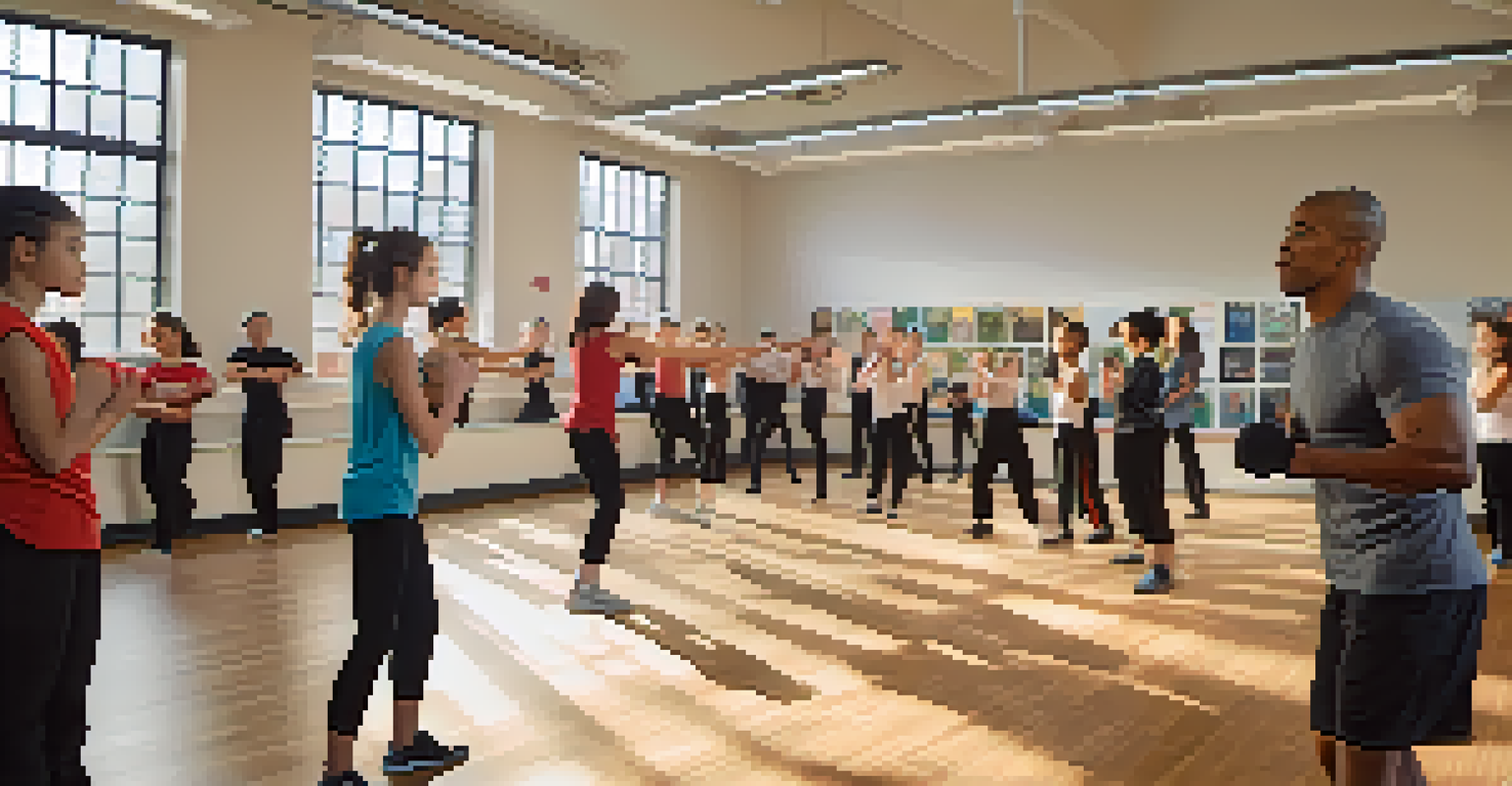Self Defense and Emotional Intelligence: A Powerful Pair

Understanding Self Defense: More Than Just Physical Skills
Self defense is often viewed as a set of physical techniques designed to protect oneself during an attack. However, it's essential to recognize that self-defense extends beyond just learning how to throw a punch or perform a kick. It includes awareness, avoidance, and de-escalation strategies that keep you safe without physical confrontation.
The greatest weapon against stress is our ability to choose one thought over another.
For instance, being aware of your surroundings and recognizing potential threats can significantly reduce the likelihood of a harmful encounter. Techniques like using body language to project confidence can deter aggressors before a situation escalates. Thus, self-defense is a holistic skill set that blends physical and mental preparation.
By incorporating emotional intelligence into the mix, individuals can enhance their self-defense capabilities. Understanding your emotions and those of others can help you read situations more accurately, making it easier to avoid conflict or defuse tense scenarios.
What is Emotional Intelligence and Why Does It Matter?
Emotional intelligence (EI) refers to the ability to recognize, understand, and manage our own emotions while also empathizing with others' feelings. This skill is crucial in various aspects of life, including relationships, workplace dynamics, and yes, even self-defense. When you can accurately assess emotions, you become better equipped to handle challenging situations.

For example, someone with high emotional intelligence can often sense when a conversation is turning hostile, allowing them to steer it in a more positive direction. This skill can help prevent physical confrontations by fostering communication and understanding. Thus, EI is a vital component of personal safety and conflict resolution.
Self Defense Goes Beyond Fighting
Effective self-defense incorporates awareness, avoidance, and emotional intelligence, not just physical techniques.
Moreover, emotional intelligence contributes to self-regulation, which is essential in self-defense scenarios. By managing your own reactions, you can stay calm and collected, making better decisions in the heat of the moment.
The Connection Between Self Defense and Emotional Intelligence
The relationship between self-defense and emotional intelligence is like two sides of the same coin. While self-defense equips you with physical skills, emotional intelligence enhances your ability to assess and navigate interpersonal dynamics. Together, they create a comprehensive approach to personal safety.
Emotional intelligence is the ability to use emotion to think more effectively.
For instance, imagine you’re in a crowded space, and you notice someone behaving aggressively. Your self-defense training would prepare you to react if necessary, but your emotional intelligence would help you assess the situation more clearly, possibly allowing you to avoid a confrontation altogether. This synergy can be a game-changer.
Additionally, integrating emotional intelligence into your self-defense training can lead to improved outcomes. Practicing scenarios that involve both physical techniques and emotional responses can help you develop a more nuanced understanding of how to react in real-life situations.
Building Emotional Intelligence for Better Self Defense
Developing emotional intelligence is an ongoing process that requires self-awareness and practice. Start by reflecting on your emotions in various situations, especially during conflicts or stressful moments. Understanding your triggers can enhance your ability to remain calm and focused during a potential threat.
Another effective way to build emotional intelligence is through active listening. When you genuinely listen to others, you not only understand their emotions better but also learn to read non-verbal cues. This skill can be incredibly beneficial in self-defense situations, allowing you to gauge the intentions of others before making a decision.
Emotional Intelligence Enhances Safety
Developing emotional intelligence helps individuals assess situations, manage their reactions, and avoid conflicts.
Engaging in mindfulness practices, such as meditation, can also sharpen your emotional intelligence. By cultivating a clear mind, you're better equipped to recognize and manage your emotions, which can significantly improve your overall response in self-defense scenarios.
Practical Ways to Combine Self Defense and Emotional Intelligence
One of the best ways to merge self-defense skills with emotional intelligence is through role-playing exercises. Practicing scenarios where you must use both physical techniques and emotional awareness can help solidify these skills in real-world contexts. This approach not only builds confidence but also prepares you for the unpredictability of actual situations.
Consider joining a self-defense class that emphasizes situational awareness and emotional regulation. Many modern self-defense programs recognize the importance of mental preparation alongside physical techniques. These classes often include discussions on emotional responses, helping you connect the two disciplines.
Lastly, reflect on your experiences post-training sessions. Analyzing what worked well and what didn’t can provide valuable insights into your emotional responses and decision-making processes. This reflection can enhance your skills over time, leading to a more integrated approach to self-defense.
The Role of Empathy in Self Defense Situations
Empathy, a core component of emotional intelligence, plays a crucial role in self-defense situations. Being able to put yourself in someone else's shoes allows you to understand their motivations and emotional states. This understanding can help you make more informed decisions about how to respond, potentially avoiding unnecessary conflict.
For example, if you encounter someone who appears agitated, your empathetic nature might prompt you to approach the situation with care rather than aggression. This approach can de-escalate tension and prevent a physical confrontation, showcasing how empathy can serve as a powerful self-defense tool.
Empathy as a Conflict Resolution Tool
Empathy allows individuals to understand others' emotions and motivations, promoting peaceful resolutions in tense situations.
Additionally, empathy can foster better communication skills, which are essential in resolving conflicts peacefully. By engaging with others in a compassionate way, you not only protect yourself but also create a safer environment for everyone involved.
Conclusion: Harnessing the Power of Both Skills
In conclusion, self-defense and emotional intelligence are indeed a powerful pair. When combined, they enhance your ability to protect yourself not just physically, but also emotionally. Understanding and managing emotions can significantly improve your chances of diffusing potentially dangerous situations before they escalate.
As you develop both skills, remember that mastery takes time and practice. Whether through training, role-playing, or mindful reflection, investing in both self-defense and emotional intelligence will empower you to navigate life’s challenges more effectively. The journey of personal safety is multifaceted, requiring both physical readiness and emotional awareness.

Ultimately, embracing this dual approach not only creates a more prepared individual but also fosters a more empathetic society. By valuing both self-defense techniques and emotional intelligence, we’re better equipped to handle conflicts in a constructive and peaceful manner.